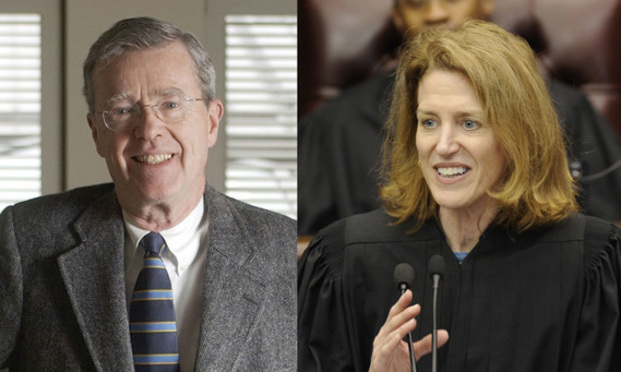11th Circuit Vacates Money Bail Injunction
The opinion vacates the preliminary injunction granted by U.S. District Court Judge Harold Murphy of the Northern District of Georgia, who has twice ruled that Calhoun's misdemeanor bail policy is unconstitutional for allowing those with cash to bail out of jail while holding others
August 23, 2018 at 01:38 PM
4 minute read
 Judge Diarmuid O'Scannlain (left) and Judge Beverly Martin (Photos: Jason Doiy and Aaron Hayes/ALM)
Judge Diarmuid O'Scannlain (left) and Judge Beverly Martin (Photos: Jason Doiy and Aaron Hayes/ALM)
The U.S. Court of Appeals for the Eleventh Circuit has ruled in a split decision that the city of Calhoun's controversial cash bail system is constitutional.
The opinion vacates the preliminary injunction granted by U.S. District Court Judge Harold Murphy of the Northern District of Georgia, who has twice ruled that Calhoun's misdemeanor bail policy is unconstitutional for allowing those with cash to bail out of jail while holding others.
“That conclusion was based on legal error by (1) failing to recognize a presumption that a bail determination made within 48 hours is constitutionally valid and (2) wrongly assuming that the Equal Protection Clause forbids jurisdictions from offering comparatively speedier release to those able to meet a bail schedule,” Ninth Circuit Judge Diarmuid O'Scannlain, sitting by designation, wrote for the majority. “A district court abuses its discretion … when it applies the incorrect legal standard.”
O'Scannlain was joined by Judge Julie Carnes. They remanded the class action lawsuit to Murphy for consideration of other claims.
“We're very pleased that the city of Calhoun's standing bail order has been ruled constitutional,” said J. Anderson Davis, an attorney with Brinson Askew Berry in Rome, who is defending the city.
The ruling drew immediate cheers from the American Bail Coalition, a bail industry organization of businesses who lend money for that purpose. The group sent out a news release calling the decision “landmark” and quoting its own executive director, Jeff Clayton: “We take enormous satisfaction that we have prevailed in our historic defense of America's bail system. We never doubted the constitutionality of bail and bail schedules. We felt strongly that the lack of adequate due process in many of the cases that challenged cash bail was the actual central factor behind plaintiffs and their complaints against the system—not the core concept of bail itself. “
Judge Beverly Martin wrote a stinging dissent.
“Maurice Walker was jailed by the City of Calhoun for six days because he was too poor to pay his bail,” Martin said. “He challenges the City's practice of jailing people before trial when they are too poor to make bond, arguing it violates the constitutional guarantees of due process and equal protection. The Majority rejects this claim, characterizing the pretrial jailing as 'merely wait[ing] some appropriate amount of time to receive the same benefit as the more affluent.'”
“I believe the Majority rewrites this court's binding precedent in Pugh v. Rainwater, 572 F.2d 1053 (5th Cir. 1978) (en banc), which held that '[t]he incarceration of those who cannot [pay for pretrial release], without meaningful consideration of other possible alternatives, infringes on both due process and equal protection requirements,'” Martin said. “The Majority fails to recognize this infringement on the rights of indigents, so I dissent.”
Sarah Geraghty of the Southern Center for Human Rights said Thursday that the plaintiffs' team will be conferring to decide whether to ask for en banc review.
“Maurice Walker was arrested in the City of Calhoun for being a pedestrian under the influence of alcohol. He could not afford to pay the preset bail sum of $160. Under the City's original policy, Mr. Walker would have had to wait 11 days after his arrest to see a judge for a bail hearing,” she said by email. “During the litigation, the City changed its policy to require that ability to pay hearings would occur within 48 hours after arrest. The federal trial court then enjoined the revised policy, reasoning that it violated the Constitution since it permitted people of means to go free while detaining indigent people for up to 48 hours, only because they could not pay.”
She said the decision sanctions the 48-hour timeline to see a judge. “Specifically, the Court held that 'indigency determinations for purposes of setting bail are presumptively constitutional if made within 48 hours of arrest,'” she said.
Geraghty said the decision means “at the very least, jurisdictions that detain arrestees for longer than 48 hours before conducting an inquiry into ability to pay bail would be wise to revise their money bail policies.”
She added, “A better, more morally defensible, and economically sound response would be to follow the lead of jurisdictions as diverse as Chicago, New Orleans, Nashville, and Atlanta in eliminating wealth-based detention all together.”
This content has been archived. It is available through our partners, LexisNexis® and Bloomberg Law.
To view this content, please continue to their sites.
Not a Lexis Subscriber?
Subscribe Now
Not a Bloomberg Law Subscriber?
Subscribe Now
NOT FOR REPRINT
© 2025 ALM Global, LLC, All Rights Reserved. Request academic re-use from www.copyright.com. All other uses, submit a request to [email protected]. For more information visit Asset & Logo Licensing.
You Might Like
View All
A Plan Is Brewing to Limit Big-Dollar Suits in Georgia—and Lawyers Have Mixed Feelings
10 minute read
On The Move: Kilpatrick Adds West Coast IP Pro, Partners In Six Cities Join Nelson Mullins, Freeman Mathis
6 minute read

Did Ahmaud Arbery's Killers Get Help From Glynn County DA? Jury Hears Clashing Accounts
Trending Stories
- 1AIAs: A Look At the Future of AI-Related Contracts
- 2Litigators of the Week: A $630M Antitrust Settlement for Automotive Software Vendors—$140M More Than Alleged Overcharges
- 3Litigator of the Week Runners-Up and Shout-Outs
- 4Linklaters Hires Four Partners From Patterson Belknap
- 5Law Firms Expand Scope of Immigration Expertise, Amid Blitz of Trump Orders
Who Got The Work
J. Brugh Lower of Gibbons has entered an appearance for industrial equipment supplier Devco Corporation in a pending trademark infringement lawsuit. The suit, accusing the defendant of selling knock-off Graco products, was filed Dec. 18 in New Jersey District Court by Rivkin Radler on behalf of Graco Inc. and Graco Minnesota. The case, assigned to U.S. District Judge Zahid N. Quraishi, is 3:24-cv-11294, Graco Inc. et al v. Devco Corporation.
Who Got The Work
Rebecca Maller-Stein and Kent A. Yalowitz of Arnold & Porter Kaye Scholer have entered their appearances for Hanaco Venture Capital and its executives, Lior Prosor and David Frankel, in a pending securities lawsuit. The action, filed on Dec. 24 in New York Southern District Court by Zell, Aron & Co. on behalf of Goldeneye Advisors, accuses the defendants of negligently and fraudulently managing the plaintiff's $1 million investment. The case, assigned to U.S. District Judge Vernon S. Broderick, is 1:24-cv-09918, Goldeneye Advisors, LLC v. Hanaco Venture Capital, Ltd. et al.
Who Got The Work
Attorneys from A&O Shearman has stepped in as defense counsel for Toronto-Dominion Bank and other defendants in a pending securities class action. The suit, filed Dec. 11 in New York Southern District Court by Bleichmar Fonti & Auld, accuses the defendants of concealing the bank's 'pervasive' deficiencies in regards to its compliance with the Bank Secrecy Act and the quality of its anti-money laundering controls. The case, assigned to U.S. District Judge Arun Subramanian, is 1:24-cv-09445, Gonzalez v. The Toronto-Dominion Bank et al.
Who Got The Work
Crown Castle International, a Pennsylvania company providing shared communications infrastructure, has turned to Luke D. Wolf of Gordon Rees Scully Mansukhani to fend off a pending breach-of-contract lawsuit. The court action, filed Nov. 25 in Michigan Eastern District Court by Hooper Hathaway PC on behalf of The Town Residences LLC, accuses Crown Castle of failing to transfer approximately $30,000 in utility payments from T-Mobile in breach of a roof-top lease and assignment agreement. The case, assigned to U.S. District Judge Susan K. Declercq, is 2:24-cv-13131, The Town Residences LLC v. T-Mobile US, Inc. et al.
Who Got The Work
Wilfred P. Coronato and Daniel M. Schwartz of McCarter & English have stepped in as defense counsel to Electrolux Home Products Inc. in a pending product liability lawsuit. The court action, filed Nov. 26 in New York Eastern District Court by Poulos Lopiccolo PC and Nagel Rice LLP on behalf of David Stern, alleges that the defendant's refrigerators’ drawers and shelving repeatedly break and fall apart within months after purchase. The case, assigned to U.S. District Judge Joan M. Azrack, is 2:24-cv-08204, Stern v. Electrolux Home Products, Inc.
Featured Firms
Law Offices of Gary Martin Hays & Associates, P.C.
(470) 294-1674
Law Offices of Mark E. Salomone
(857) 444-6468
Smith & Hassler
(713) 739-1250






